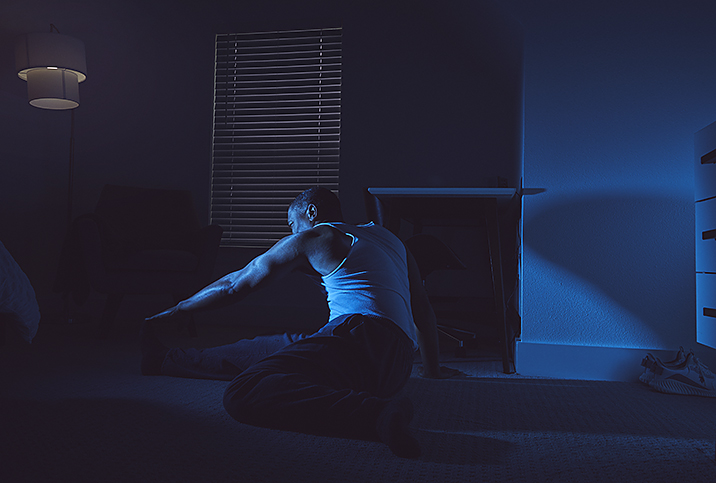For a Good Night's Sleep, Take a Deep Breath

Sleep and sex are interesting relatives. Both typically occur in bed (and sometimes in other places, to varying degrees of legality). Both have about a million remedies sold for myriad issues, with all kinds of worrisome side effects. And both can be improved through mindful breathing.
Obviously, this isn't the only tip you've heard to achieve better sleep. The internet is rife with opinions on the best possible nighttime routine, but sleep expert Devin Burke, a bestselling author, speaker, renowned sleep coach and founder of the Sleep Science Academy, warns against going too far off the deep end.
"Doing something so that you sleep can actually be counterproductive," Burke said. "Just doing it to do it is the best mindset to have around these techniques. If you're like, 'I'm going to do this technique so that I sleep,' that can create hyperarousal or expectation, which is a form of stress that can actually keep you in a sympathetic state of mind."
The hormone of darkness
The sympathetic nervous system exists in direct opposition to the parasympathetic nervous system; while the former triggers fight-or-flight responses, the latter influences the far more enjoyable rest and digest process. Simply put, there's no good sleep when we're stressed out—especially when we're stressing over the sleep we're missing. Licensed acupuncturist and massage therapist Tsao-Lin Moy explained the mechanics that tie respiration to hormone production.
"Melatonin is known as the hormone of darkness because as evening approaches, the body's circadian rhythm signals melatonin production and release. Time for the body to power down and sleep," Moy said. "As the morning approaches, the circadian rhythm releases cortisol to wake up."
Diaphragmatic breathing, colloquially known as belly breathing (think of how an infant's stomach lowers and rises when they sleep), is the key to natural, uninterrupted sleep and the natural counter to shallow breaths, which generate cortisol, the body's primary stress hormone. According to Burke, specific techniques can make the most of belly breathing.
"One of our favorite [breathing methods] that we teach is called box breathing," Burke noted. "It's inhaling for a count of four, holding for a count of four, exhaling for a count of four, holding for a count of four and doing that 10 times. [Studies have] found that you need to do it at least 10 times to really start to activate the parasympathetic [system]. You want to breathe down into the entire lobe of the lungs."
Moy has her own favorites. "A breathing technique known as 4-7-8 breathing helps to slow the heart rate and the parasympathetic nervous system," she said. Even beyond the bedroom, the 4-7-8 technique can be utilized during stressful situations to keep emotions under control. Simply breathe in for 4 seconds, hold the breath for 7 seconds and exhale for 8 seconds.
The nose knows
Regardless of the duration, breath counting constitutes a type of meditation wherein a practitioner focuses on deep, diaphragmatic breathing and counts each breath. The best part is it doesn't matter if you lose count—you can count just one breath before starting over and the result will be just as effective as counting to some towering figure.
While a total tally of breath doesn't matter unless you're monitoring respiration rate, how you breathe very much matters. Burke said when it comes to sleep, the nose knows.
"I'm a big believer in nasal breathing," he explained. "A lot of people are mouth breathers, and there are studies that show breathing through your nose, specifically during the night, is more health beneficial and creates more nitrous oxide, filtering out toxins, dusts, all of the stuff that's pulling on the air—a more restorative sleep."
Considering our nostrils are lined with a purification system of small hairs, it makes sense that air quality improves when passed through the nose.
It's not just stress and filtration that good breathing plays a role in. Moy explained that proper breathing technique is fundamental to rest.
"Breathing and breathwork do more than regulate the nervous system and reduce cortisol levels," she said. "Studies show that higher levels of oxygen encourage deep and restorative sleep known as slow-wave sleep. Less than normal levels of oxygen keep the brain in an 'active' sleep state that is not as restorative. People with sleep apnea experience intermittent oxygen desaturation, meaning the lower oxygen levels will interfere with the normal stages of a sleep cycle."
Sleep, like sex, is a facet of life with endless opportunities for improvement. It takes the right mindset and practice, but importantly, too, patience for your body. Beating yourself up over it definitely won't accomplish anything productive.


















